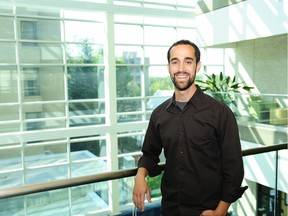U of R team using new testing technology to identify, track viruses
"When we can see those transmission routes, that helps public health intervention to stop transmission."

Article content
As cold and flu season looms, more people are expected to show COVID-19-like symptoms, and a team of researchers led by the University of Regina is creating a test that would check for numerous viruses at once to identify exactly what is the cause of someone’s cough or sore throat.
Andrew Cameron, an associate professor of biology at the U of R and co-director of the Institute for Microbial System and Society, is working with the provincial laboratories in Saskatchewan, Manitoba and British Columbia on the project.
Right now, laboratories test for one virus — recently COVID-19 — and then wait for the result. If the sample tests negative, it is retested for another virus and so on until the virus making someone sick is revealed.
A $240,000 grant from Genome Prairie and a $50,000 grant from the Saskatchewan Health Research Foundation have allowed Cameron and his team to begin testing their new technology to condense this process.
Starting in around a month, Cameron said researchers will be ready to test for every virus at once using genome sequencing.
“We’re prepared to do most of the work through the winter when most of the infections are happening,” he said.
“Very quickly we’ll start to get answers … we’ll start to get new insights because we’ll be testing for things that we’ve never testing for before in patient samples.”
Genome sequencing involves looking at the genetic makeup of an organism. By doing this, scientists are able to identify an infection more accurately and see if the person has more than one virus at the same time. This is called a co-infection.
Knowing if someone has more than one virus could potentially help medical professions understand why one person is hit harder by COVID-19 than another. This becomes increasingly relevant as Saskatchewan’s regular cold and flu season over the cold months approaches.
“It’s much harder for our bodies to fight multiple adversaries at the same time, and they can have compounding effects on causing tissue damage and weakening our defences,” Cameron said.
“We’re now coming close to the precipice of cold and flu season and that’s very concerning from a public health perspective because as we move indoors, it just means that more and more respiratory diseases can transmit.”
But genome sequencing doesn’t just reveal the type of virus with which someone is infected. It also shows how they contracted that virus, because the genome looks a little bit different depending on from where or who it comes. It can also highlight when there is no link between certain COVID-19 cases.
Cameron said already scientists are using the data genomes provide to map the spread of COVID-19 across the globe, and more recently between provinces.
Once Cameron’s technology is being used to test samples coming into the three partnered provincial laboratories, researchers will be able to track the spread of COVID-19 as well as the spread of other viruses.
“When we can see those transmission routes, that helps public health intervention to stop transmission,” he said.
-
 Researchers discover why Katepwa Lake fish have high levels of methylmercury
Researchers discover why Katepwa Lake fish have high levels of methylmercury -
 'It's eerily quiet:' Life at the U of R will be far from normal this fall
'It's eerily quiet:' Life at the U of R will be far from normal this fall -
 'A lazy thinking problem:' U of R professor studying why people share disinformation
'A lazy thinking problem:' U of R professor studying why people share disinformation -
 U of R professor receives nearly $1M for COVID-19 treatment research
U of R professor receives nearly $1M for COVID-19 treatment research










Postmedia is committed to maintaining a lively but civil forum for discussion. Please keep comments relevant and respectful. Comments may take up to an hour to appear on the site. You will receive an email if there is a reply to your comment, an update to a thread you follow or if a user you follow comments. Visit our Community Guidelines for more information.